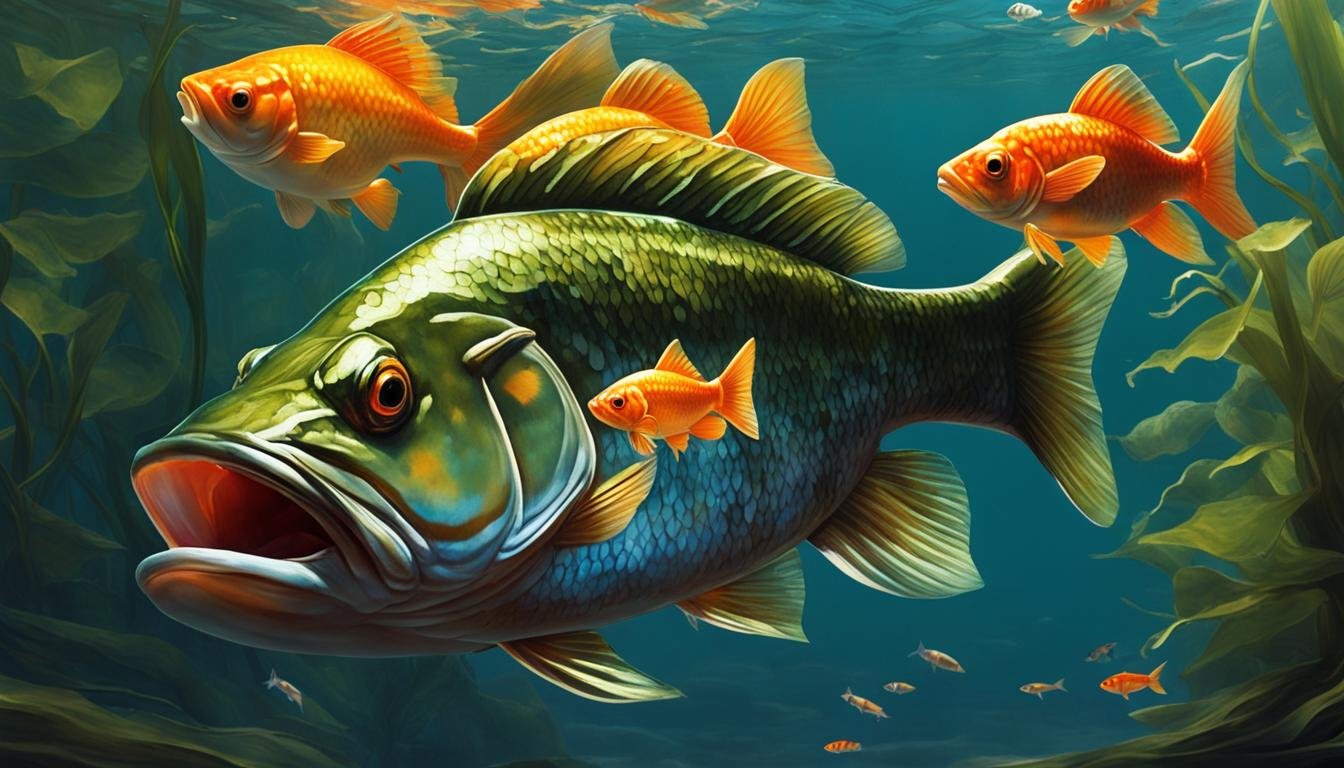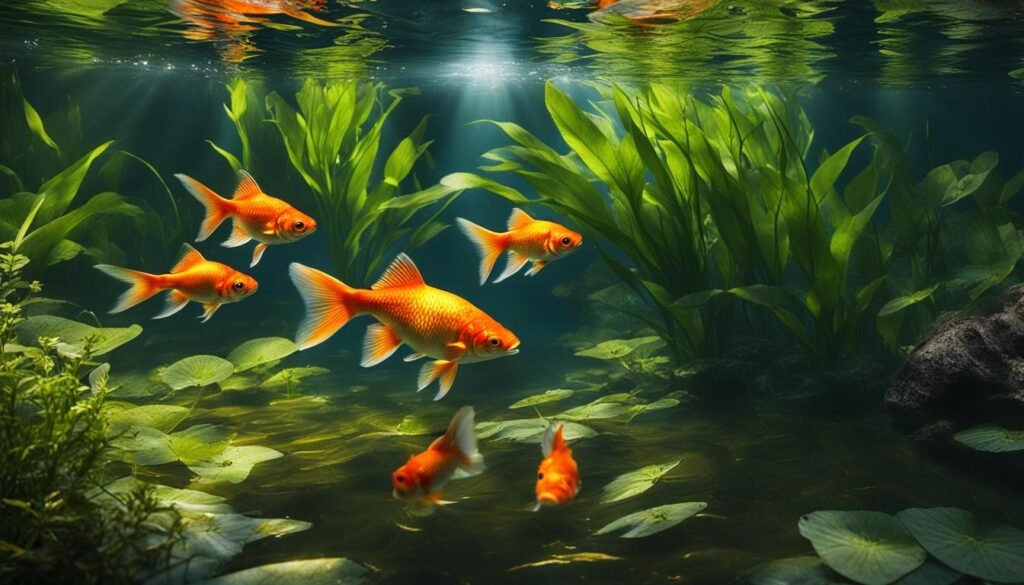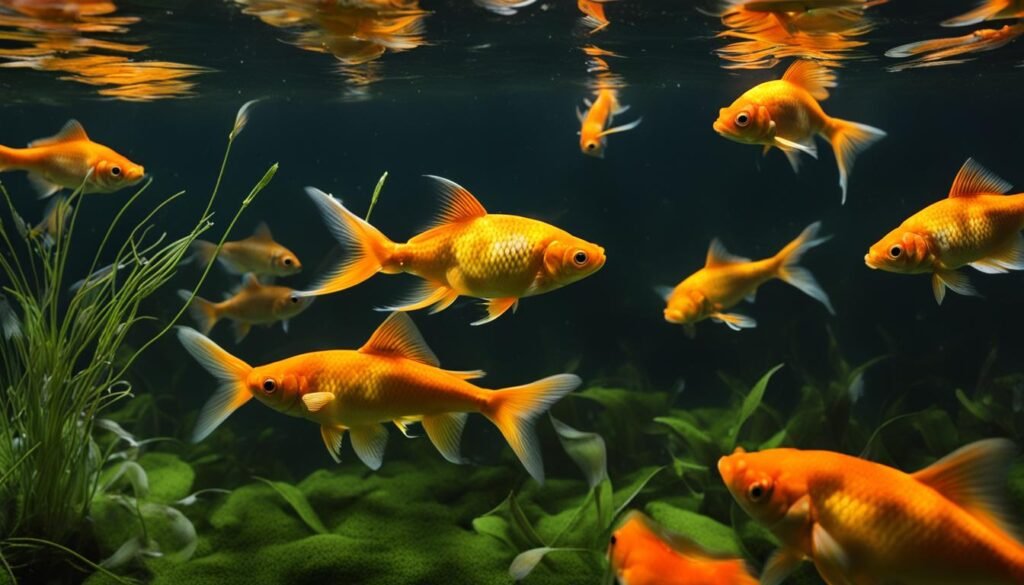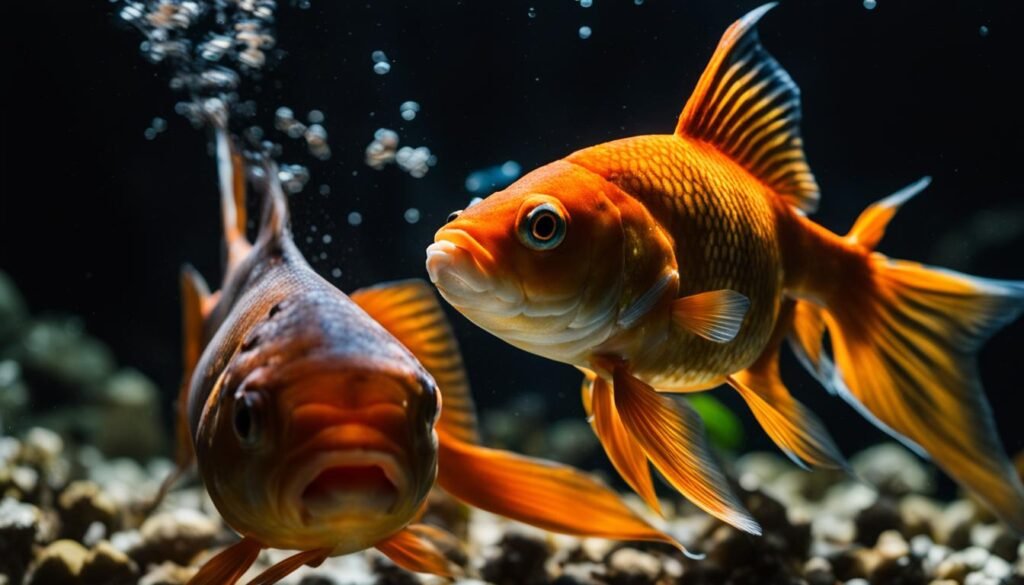Your cart is currently empty!

Do Bass Eat Goldfish? Uncovering Underwater Secrets
Welcome to our article where we explore the fascinating world of bass eating habits and their potential interactions with goldfish. Bass, particularly largemouth bass, are infamous for their predatory behavior and insatiable appetites. While goldfish may not be a natural part of their diet, bass are known to seize the opportunity and consume these colorful fish under certain circumstances. Join us as we delve into the feeding habits of bass and the potential impacts of introducing goldfish into their environment.
Key Takeaways:
- Bass, especially largemouth bass, have predatory behavior and are opportunistic feeders.
- While goldfish are not a natural part of their diet, bass will consume them when available.
- Feeding goldfish to bass in artificial environments can have negative ecological impacts.
- Goldfish can become part of the bass’s diet in environments where they have been introduced as non-native species.
- Goldfish are preyed upon by various animals, including herons, raccoons, and certain amphibians and reptiles.
Bass Eating Habits: What Do They Prefer?
In order to understand whether bass eat goldfish, it’s crucial to examine their eating habits and preferences. While bass primarily feed on a variety of aquatic creatures such as minnows, shad, and crayfish, they are opportunistic predators. This means that they will take advantage of any food source that presents itself, including goldfish. Despite goldfish not being a typical part of their natural diet, bass will readily consume them when given the opportunity.
Goldfish, with their bright colors and slow movement, can make an easy target for bass. Their lure is hard for bass to resist, making them vulnerable to predation. However, it’s important to note that goldfish should not be intentionally introduced into bass habitats, especially in artificial environments like ponds or aquariums. Feeding goldfish to bass in such settings can have negative ecological impacts and should be done with caution, if at all.
H3: The Impact of Goldfish Consumption on Bass
When bass consume goldfish, it can have both positive and negative effects. On one hand, goldfish provide a source of nutrition for bass, contributing to their growth and overall health. Additionally, goldfish consumption can help control their population in situations where goldfish have become an invasive species.
On the other hand, the presence of goldfish in bass habitats can disrupt the natural balance of the ecosystem. Goldfish can outcompete native species for resources and alter the habitat structure. This can lead to declines in native fish populations and negatively impact water quality. Therefore, it is important to manage goldfish populations in bass habitats to maintain the ecological integrity of the ecosystem.
The Role of Goldfish in Bass Habitats

In the wild, bass typically feed on a variety of small fish, insects, and crustaceans. They are opportunistic predators, constantly on the lookout for available food sources. This brings us to the question: what do bass eat in the wild? While goldfish may not be a natural part of their diet, they can become part of the bass’s food chain under certain circumstances.
Bass are known to prey on goldfish, particularly in environments where goldfish have been introduced as non-native species. The availability and vulnerability of goldfish as potential prey items make them an attractive target for bass. When given the opportunity, bass will take advantage of any food source that presents itself, and goldfish are no exception.
It is important to manage goldfish populations in bass habitats to maintain the balance of the ecosystem. While bass may eat goldfish, introducing them into bass habitats can disrupt the natural food chain and have negative ecological consequences. Controlling goldfish populations helps protect native species and ensures the overall health of the aquatic ecosystem.
Why do bass eat goldfish?
Bass eat goldfish mainly due to the availability and vulnerability of these fish as potential prey. Goldfish have bright colors and slow movement, making them easy targets for bass. While goldfish may not be a typical part of the bass’s natural diet, they can become a food source when introduced into their habitats.
It is important to note that feeding goldfish to bass in artificial environments, such as ponds or aquariums, should be done with caution. Introducing goldfish into these environments can have negative ecological impacts and disrupt the balance of the ecosystem. Responsible management of goldfish populations is essential to protect the integrity of bass habitats and maintain the overall health of the ecosystem.
Other Predators of Goldfish
Goldfish, despite their peaceful appearance, are not without their share of predators. Various animals in both their natural and introduced environments prey upon goldfish, making them vulnerable to predation.
One of the main predators of goldfish is the heron. These long-legged birds with their sharp beaks have been known to target goldfish as a food source. Kingfishers, another bird species, are also skilled hunters of goldfish. With their impressive diving abilities, they can quickly snatch goldfish from the water surface.
Other predators that consume goldfish include raccoons, largemouth bass, and certain amphibians and reptiles. Raccoons are opportunistic feeders and will not pass up an easy meal of goldfish when they come across them. Largemouth bass, like raccoons, are known for their voracious appetites and will readily consume goldfish when given the chance. Amphibians and reptiles, such as bullfrogs and turtles, also prey on goldfish, especially in aquatic environments.
Predators of Goldfish:
- Heron
- Kingfisher
- Raccoon
- Largemouth bass
- Amphibians and reptiles
The presence of these predators highlights the importance of controlling goldfish populations and protecting the integrity of aquatic ecosystems. It is crucial to manage goldfish populations in order to maintain the balance of the ecosystem and prevent negative impacts on native species.
Acknowledging the existence of these predators and their role in the ecosystem can help us understand the complexities of the food web and the delicate balance of nature.
Ecological Consequences of Goldfish Invasions

Goldfish invasions can have significant ecological impacts, leading to the disruption of aquatic ecosystems. When introduced into new environments, goldfish can become invasive species, outcompeting native species for resources and altering the balance of the ecosystem. Their ability to reproduce rapidly contributes to their invasive success, further exacerbating the ecological consequences.
One of the main ecological impacts of goldfish invasions is the decline in native fish populations. Goldfish, with their aggressive feeding habits and competition for resources, can outcompete and displace native fish species. This can have cascading effects on the entire food chain and disrupt the balance of the ecosystem.
The ecological impact of goldfish invasions includes:
- Changes in habitat structure: As goldfish disturb the aquatic environment, they can alter the physical structure of the habitat, such as by uprooting plants and disturbing sediments. This can affect the availability of shelter and breeding grounds for native species.
- Degradation of water quality: Goldfish are known to disturb the sediment and release excess nutrients into the water, leading to increased turbidity and nutrient pollution. This can negatively impact water quality, affecting the health of native aquatic species.
- Disruption of ecological processes: The introduction of goldfish can disrupt natural ecological processes, such as nutrient cycling and energy flow. This can have far-reaching effects on the overall functioning of the ecosystem.
It is crucial to implement mitigation and prevention measures to control goldfish populations and minimize their ecological impact. This includes the removal of existing populations, monitoring and early detection of new introductions, and educating the public about responsible pet ownership to prevent the release of goldfish into the wild. By taking these measures, we can help protect native aquatic species and maintain the integrity of our aquatic ecosystems.
Ethical Considerations of Goldfish Predation

When discussing the predation of goldfish, it’s important to explore the ethical considerations surrounding this topic. As humans, we have a responsibility to consider the welfare of all creatures, including goldfish, and to question the ethical implications of their use as prey.
Goldfish, like any other living beings, deserve to be treated with compassion and respect. Intentionally introducing goldfish into environments where they become prey raises ethical concerns. It’s vital to consider the impact on their well-being and whether it aligns with our responsibility as stewards of the natural world.
The welfare of goldfish
Goldfish predation raises questions about the welfare and treatment of these animals. While goldfish are not native prey of bass, they can still fall victim to their opportunistic feeding habits. This raises concerns about the suffering experienced by goldfish when they are consumed. As compassionate individuals, we must consider the ethical implications of subjecting these animals to potential harm solely for the entertainment or convenience of others.
Promoting responsible pet ownership and conservation
To prevent goldfish predation and ensure the well-being of these animals, it is crucial to promote responsible pet ownership. Educating individuals about the proper care and containment of goldfish can help prevent their release into the wild, where they can become invasive species.
Additionally, conservation efforts play a vital role in protecting the integrity of aquatic ecosystems. By managing goldfish populations and actively working to control their spread, we can help safeguard the native species that rely on these habitats.
In conclusion, the ethical considerations surrounding goldfish predation remind us of our duty to respect and protect all living creatures. By promoting responsible pet ownership and supporting conservation efforts, we can strive to maintain a balance in our aquatic ecosystems and preserve the welfare of goldfish and other species.
Conclusion
In conclusion, we have uncovered the underwater secrets of bass eating habits and their relationship with goldfish. While bass are not natural consumers of goldfish, they are opportunistic feeders and will consume them when given the chance. However, it is important to note that introducing goldfish into bass habitats can have negative ecological consequences.
Bass primarily feed on a variety of aquatic creatures such as minnows, shad, and crayfish. Although goldfish may not be a typical part of their diet, their bright colors and slow movement make them an easy target. Feeding goldfish to bass in controlled environments, such as ponds or aquariums, should be done with caution to avoid disrupting the balance of the ecosystem.
Goldfish invasions can have significant ecological impacts, including the decline of native fish populations and changes in habitat structure. It is crucial to manage goldfish populations and promote responsible pet ownership to prevent the release of goldfish into the wild. By considering the ethical implications of goldfish predation and taking active conservation measures, we can protect the welfare of these animals and the integrity of our aquatic ecosystems.
FAQ
Do bass eat goldfish?
Yes, bass are known to eat goldfish when given the opportunity. However, goldfish are not a natural part of their diet.
What do bass prefer to eat?
Bass primarily feed on minnows, shad, and crayfish, but they are opportunistic feeders and will eat other fish if available.
Why do bass eat goldfish?
Bass will consume goldfish when they are present and vulnerable, even though goldfish are not a typical part of their natural diet.
What other animals eat goldfish?
Predators such as herons, kingfishers, raccoons, and even certain amphibians and reptiles have been known to consume goldfish.
What are the ecological consequences of goldfish invasions?
Goldfish invasions can disrupt the balance of aquatic ecosystems, leading to declines in native fish populations and changes in habitat structure and water quality.
What are the ethical considerations of goldfish predation?
The treatment of goldfish and their use as prey raises ethical questions, and responsible pet ownership is important to prevent the release of goldfish into the wild.
Leave a Reply